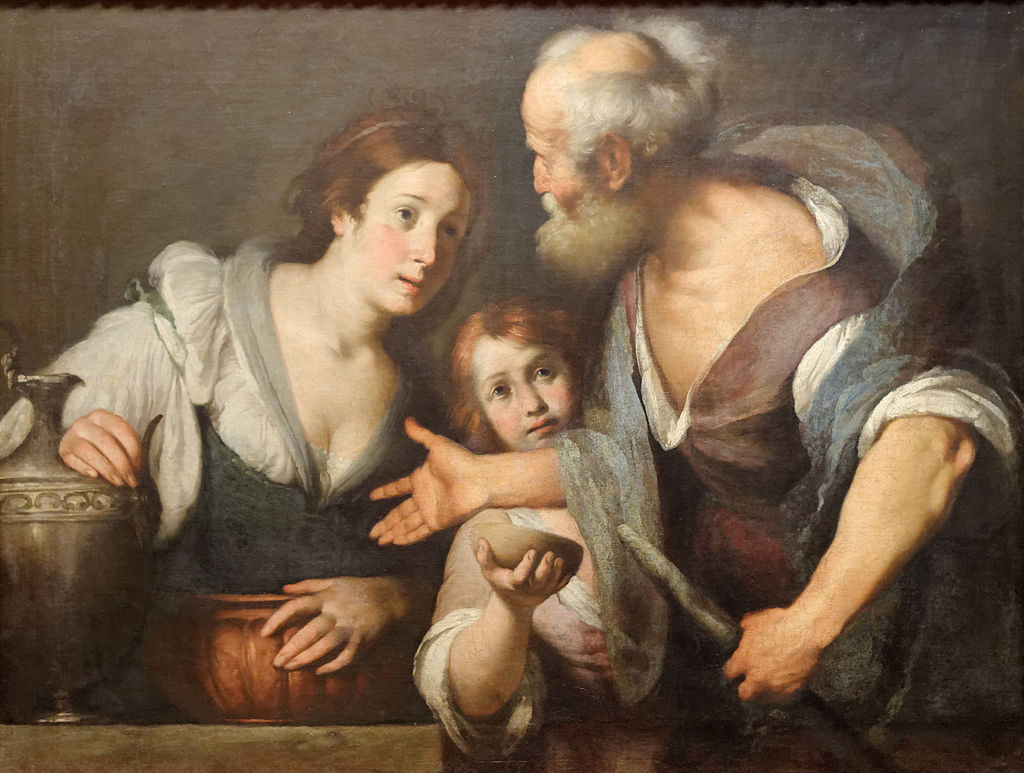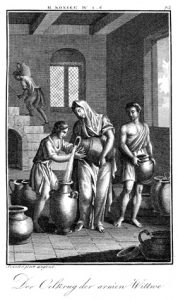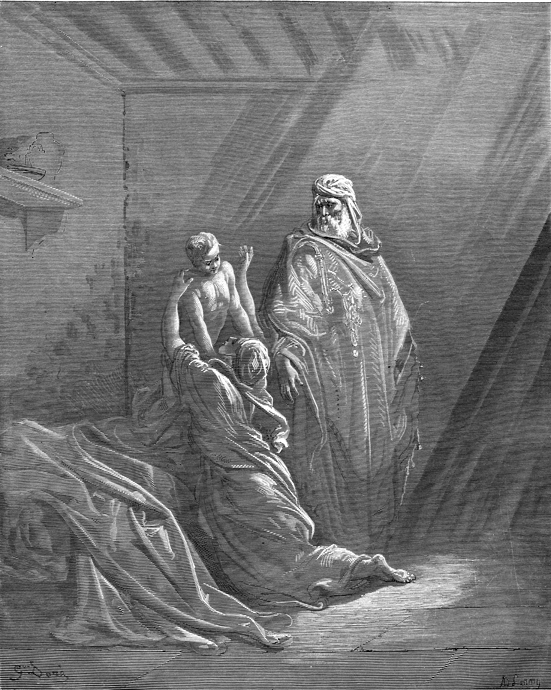
890 BC to 870 BC, Psalm 3: Elijah
This site was first built in French (see www.147thgeneration.net). The English translation was mainly done using « google translation ». We have tried to correct the result of this translation to avoid interpretation errors. However, it is likely that there are unsatisfactory translations, do not hesitate to communicate them to us for correction.
(for that click on this paragraph)
Summary
This generation is from the years 890 BC to 870 BC
According to our count, this generation is the 3rd generation associated with Psalm 3. It is in this Psalm 3 that we therefore find an illustration of the facts of this generation.
If Asa sought salvation in the Lord when the threat came from outside (the Ethiopian Zerah), this is not the case when threatened by Baasa the king of Israel. Instead of joining forces with the Lord, this time he joined forces with Ben hadad, king of Syria. This unnatural remedy provokes the anger of the Lord, who promises Asa never to cease to be at war.
This generation also corresponds to the biblical episode of the prophet Elijah and the widow of Zarephath. He performs miracles to save his son’s life.
Talk
Asa’s errors of alliance
This psalm covers in particular the second part of the long reign of Asa, king of Judah. If Asa sought salvation in the Lord when the threat came from outside (the Ethiopian Zerah), it is not the case when it is threatened by Baasa the King of Israel. Instead of allying himself with the Lord, he was this time associated with Ben Hadad king of Syria:
- In the [1] thirty-sixth year of Asa’s reign Baasha king of Israel went up against Judah and fortified Ramah to prevent anyone from leaving or entering the territory of Asa king of Judah.
- Asa then took the silver and gold out of the treasuries of the Lord’s temple and of his own palace and sent it to Ben-Hadad king of Aram, who was ruling in Damascus.
- “Let there be a treaty between me and you,” he said, “as there was between my father and your father. See, I am sending you silver and gold. Now break your treaty with Baasha king of Israel so he will withdraw from me.”
This unnatural recourse provokes the anger of the Lord:
- At that time [2], Hanani the seer came to Asa king of Judah and said to him: “Because you relied on the king of Aram and not on the Lord your God, the army of the king of Aram has escaped from your hand.
- Were not the Cushites and Libyans a mighty army with great numbers of chariots and horsemen ? Yet when you relied on the Lord, he delivered them into your hand
- For the eyes of the Lord range throughout the earth to strengthen those whose hearts are fully committed to him. You have done a foolish thing, and from now on you will be at war.”
When David writes his psalm, his own son Absalon is an enemy and is distraught because of God’s support for another representative of the people of Israel.
Asa has the same problem, he has no worries when he is attacked by foreign peoples whatever the strength of their army, but to fight the kingdom of Israel he does not dare to count on divine support.
But David shrugs from his own lesson to remind Israel’s descendants that the only choice for his survival is to protect himself behind his God.
By doing so, Asa did not have to fear foreign threats. By doing otherwise when threatened by Baasa, seeking refuge with the king of Syria rather than with God increases his vulnerability.
Elijah
In this sense it is necessary to interpret the stay of Elijah [3] in the widow of Sarepta which can be located at the beginning of the reign of Ahab king of Israel, therefore during the third generation:
- Then [4] the word of the Lord came to him:
- “Go at once to Zarephath in the region of Sidon and stay there. I have directed a widow there to supply you with food.”
In exchange for the widow’s lodging, Elijah guarantees her by means of miracles. However, the health of the widow’s son became worse:
- Some time [5] later the son of the woman who owned the house became ill. He grew worse and worse, and finally stopped breathing.
- She said to Elijah, “What do you have against me, man of God? Did you come to remind me of my sin and kill my son?”
- “Give me your son,” Elijah replied. He took him from her arms, carried him to the upper room where he was staying, and laid him on his bed.
- Then he cried out to the Lord, “Lord my God, have you brought tragedy even on this widow I am staying with, by causing her son to die?”
- Then he stretched himself out on the boy three times and cried out to the Lord, “Lord my God, let this boy’s life return to him!”
- The Lord heard Elijah’s cry, and the boy’s life returned to him, and he lived.
- Elijah picked up the child and carried him down from the room into the house. He gave him to his mother and said, “Look, your son is alive!”
- Then the woman said to Elijah, “Now I know that you are a man of God and that the word of the Lord from your mouth is the truth.”
We can equate the widow with the people of Israel in the desert and her son with the generations that will succeed each other during the three millennia of night following the death of Solomon.
The faults of which the widow speaks are the three major faults committed by the people of Israel in the desert, each of which produced three series of forty-nine curses. Each of these mistakes should have provoked the annihilation of the people of Israel if Moses did not intercede with God to avoid this ultimate punishment.
Each of the series of curses will largely test the people of Israel, each time risking their annihilation: their illness worsened to the point where they had no breath left. This is why Elijah three times extends over the child so that each series of curses does not go until the death of the child, until the annihilation of the people of Israel. This divine intervention is done in the upper chamber of the humble home of the widow so that it remains discreet, the divine preservation of the people of Israel is in the high spheres of God and can not be felt on earth. On earth, people think instead that God has abandoned his people.
This is summarized in the beginning of the psalm of this generation:

- A song of David, when he fled from Absalom his son.
- O Lord, how many have my adversaries become! Great men rise up against me.
- Great men say concerning my soul, « He has no salvation in God to eternity. »
Unlike Asa (in his end of reign), Elijah holds his hopes in the Lord and it is to him that he cries to obtain the life of the son of Sarepta. It is this call to the divine which is mentioned in the following verses of the psalm:

- But You, O Lord, are a shield about me, my glory and He Who raises up my head.
- With my voice, I call to the Lord, and He answered me from His holy mount to eternity.
In fact God has preserved the breath of Israel so that he wakes up completely at the end of the three series of curses. Thus the breath of the child of Sarepta has not completely disappeared despite the accumulated faults of Sarepta. It is the same for the people of Israel who will suffer the curses but who always keep a breath to be reborn at the appropriate time. When the people of Israel are convinced that salvation does not come from earthly powers but only from divine power, then it can be reborn in the image of the child of Sarepta. As the conclusion of the Psalm of this generation indicates:

- I lay down and slept; I awoke, for the Lord will support me.
- I will not fear ten thousands of people, who have set themselves against me all around.
- Arise, O Lord, save me, my God, for You have struck all my enemies on the cheek; You have broken the teeth of the wicked.
- It is incumbent upon the Lord to save, and it is incumbent upon Your people to bless You forever.

[1] II Chronicles, Chapter 16, verses 1 to 3
[2] II Chronicles, Chapter 16, verses 7 to 9
[3] See: Melachim I – I Kings – Chapter 17
[4] Melachim I – I Kings – Chapter 17, verses 8 and 9
[5] Melachim I – I Kings – Chapter 17, verses 17 to 24


